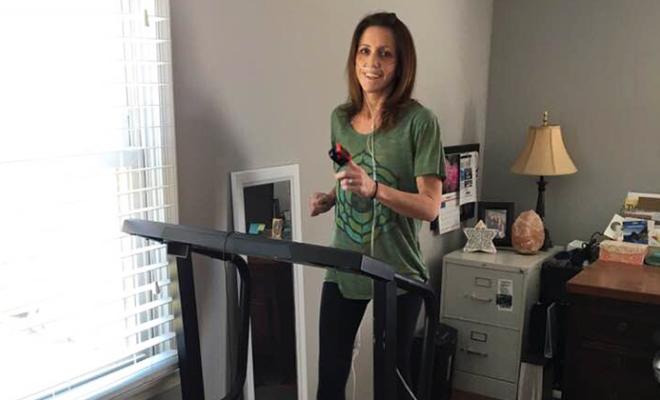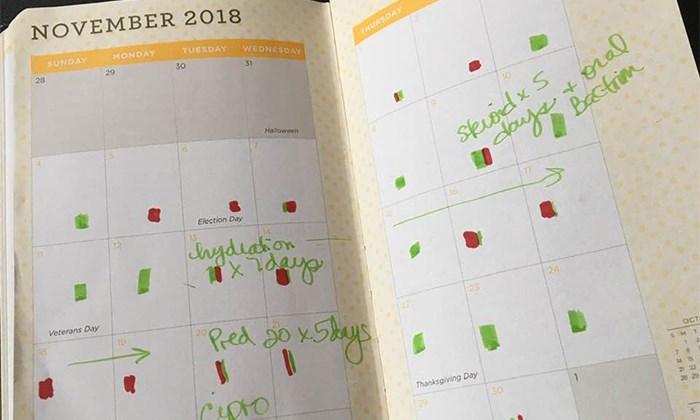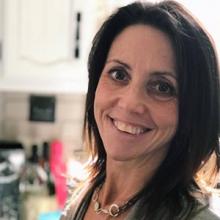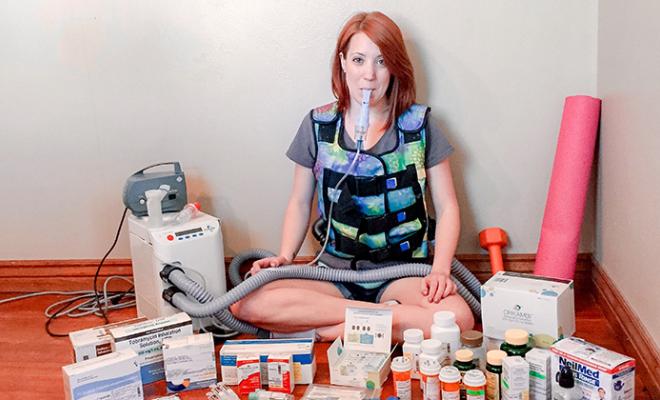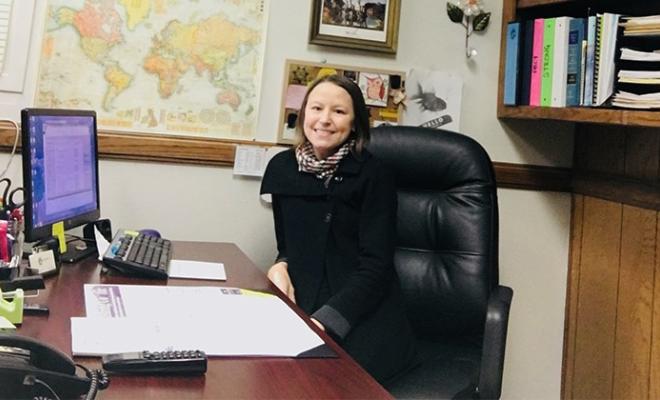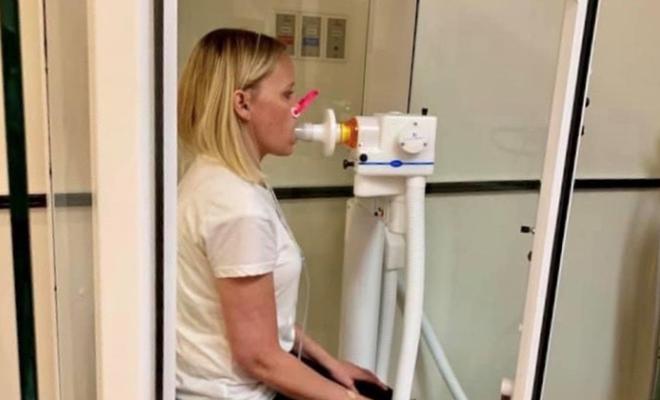“It's official. As of yesterday afternoon, I am listed on the transplant list for new lungs,” I posted on my Facebook wall. An outpouring of love and support grew by the hour in the form of comments following my post. Two days later I was still looking back at it -- and all of the comments -- still digesting that was MY post!?! My mind bounced all over the place during the course of each day from fear to excitement to anxiety to hope, with the question “How did I get here?” in between. I want to share with you how I got here, how I decided to list for transplant, and what I think helped me the most.
It started four years ago. I had worked full time as a nurse for 22 years, the last five of it working as a case manager from the comfort of my home. I couldn't have imagined a better job! Working from home cut out my commute time and allowed me more time for my daily routine of nebulizer treatments, chest therapy, exercising, and eating all day long, as well the added perk of working in my pajamas if I chose. I mean, what could be better?
And still, the decline came, despite a dream job and my best efforts. It was drastic and seemed to come out of nowhere, my forced expiratory volume (FEV1) fell from 45 percent to 26 percent seemingly overnight. I found myself so out of breath just taking a shower, that I'd have to sit down and recover for a few minutes before having the breath to get dressed. So into the clinic I go, and my doctor says the "T" word asking me if it's something I want to pursue, or not. Transplant. WHAT?? For ME??
My mind was instantly whirling. I heard myself say "yes" and I remember hearing the words "early referral" and then jumping to the plan for intravenous (IV) antibiotics. By the time I drove home, I had decided I needed to stop working. I wasn't sure, yet, how it would work financially, but I knew I'd have to figure it out. I reached out to my employer and started making CF my full-time job, in hopes that I could keep that "T" word at arm's length for as long as possible.
That's exactly what I've done for the past four years now. My doctor told me I am a great example of when stopping work can help stabilize and benefit your CF health. I was hoping I'd go even longer before I'd have to seriously consider transplant. To be honest, I never thought I'd have to seriously consider transplant. I have two rare mutations and was hoping one of the cystic fibrosis transmembrane conductance regulator (CFTR) modulators would be found to work for me, or I thought maybe I'd be in the group that would go through gene editing as my "cure." It's been hard to realize that transplant really is in my future.
This past year I have had to work even harder than normal to maintain my low lung function, with multiple steroid bursts and rounds of IV antibiotics. I've now got a chest port and do monthly hydration at home. I need more rest, and -- this past month -- I have become oxygen-dependent.
Each day is like the movie, Groundhog Day. I do my treatments and chest PT and take my medications. I get plenty of rest, eat as much as I can, and exercise, with the normal household chores intertwined. I carefully plan my social outings and include days of rest before and after.
I realize my health status is not great compared to other people my age without CF. There is no way I could keep up if I continued to work, or do all that I see others doing on social media. But, still, when someone asks how I am doing, my standard response is always "I'm hanging in there."
I have come to find that people with CF are so strong and resilient. It's a blessing -- in many cases -- but in trying to decide when is the right time to list for transplant, it can also be a curse, or I am finding it is with me.
It's amazing and crazy how I have adjusted over the years to each decline in my lung function, so much so that I was shocked when my doctor brought up the topic of transplant at 26%.
And though I have only maintained a 35 percent lung function for four years, I am now used to it, so I still doubted if it was the right time to move forward with transplant evaluation, testing, and listing. I knew I had been having more bad days, but it's hard to keep track of when or how often. Knowing that my CF doctor and the transplant team were suggesting it was time to list and awaiting my answer, my mom suggested I use a calendar and mark each day with how I felt leading up to my next clinic visit.
So I grabbed my calendar and to keep it easy, I used a green and red marker. Each evening as I did my last breathing treatment, I'd evaluate my day, putting a green mark on the calendar if it had been a good day, and a red box if I had a bad day. Many days I marked both red and green as I found most days seemed to be, meaning I had a rough morning but the day got better, or maybe I felt good in the morning but by evening I was wiped out or not feeling well. I was basing this solely on my physical symptoms such as energy and pain levels, and shortness of breath. By the time my clinic visit rolled around, I had a full calendar month colored in.
To my surprise, there was a lot of red -- more red than I wanted to see and more red than I felt comfortable seeing, especially knowing I had been on prednisone, hydration, and oral antibiotics that month. And that is what helped pushed me over the edge to say, "OK, I'm ready to list." Living with CF you learn to be strong and you learn to keep on going and I think with that mentality I could keep on going until I literally drop. So, this calendar helped me see my current health status in a different way and be able to make a decision that was difficult mentally and emotionally, where my instinct would normally be to say, "I'm okay, I can keep going." This calendar gave me a perspective to measure with, where I could override my emotional response and use my brain to look at the data and know it was time to move forward in this process.
As I sit here, now listed for transplant, I am thankful. I'm thankful that I have an amazing care center close to me that not only does transplants, but does a lot of them, and even takes some of the more difficult cases. I am thankful that I was accepted at my care center, as being a good candidate to list.
One of the things I'm most thankful for is that my doctor referred me to the transplant team and process early. Although it scared me to hear the word, it gave me the luxury of time.
I had time to think about my decision; time to research the enormity of the commitment; time to reach out and talk with others who had been through this and find out what post-transplant life looks like; time to come to terms with where my health was; time to fight and see if I could make it better; time for the transplant team to get to know me as a person; time to digest that this next step was right for me; time to get affairs in order; and time to mentally and physically prepare myself and my family.
I'm not sure when "the call" will come, or how it will go, but I do know that I feel I'm doing the right thing at the right time with the right team and that it has been a long process to come to peace with all of that. I know it is scary, but I'd highly recommend early transplant referral so that others will have the opportunity of time to think, research, digest, fight, discuss, and prepare as much as possible. Whatever their final decision may be, at least they had the luxury of time to figure it out. And, as we are all well aware, time is one of the luxuries people with CF rarely get.
Join the conversation on Facebook.

